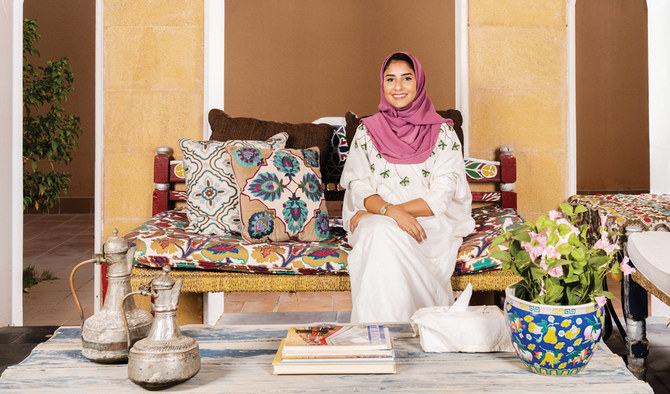Through traveling and exploring, I want to create a directory of different places and services around the Kingdom to guide explorers through the crevices of Saudi Arabia.
Born and raised in Riyadh, both of my parents were always interested in history, culture and heritage, rubbing off their attention to detail on my siblings and me. From a very young age, my family would travel somewhere new during summer breaks, usually to a culturally and historically rich area where we’d soak into discovery, instilling in us a sense of curiosity, to know and see more of the world.
Initially, I wanted to get into interior design, but I ended up graduating from King Saud University with a bachelor’s in art education. After that, my family encouraged me to pursue my education abroad. They insisted I go, if not for my education then for the experience, and I received my master’s degree in fine arts from Claremont Graduate University in California.
When I lived in California, I enjoyed taking long drives on the weekends to explore cities, villages and museums, searching for things that stood out of the ordinary in every nook and cranny.
Coming back to Saudi Arabia made me feel a little trapped at the time, and while working one day, a light bulb went on inside my head, leading me toward discovering the land in which I was born. At the time, I thought to myself: “Why hadn’t I ever tried that?”
At the time, we ended up exploring Hail, and I decided that every month I was going to explore at least one new city or area, and it has led me to grow attached to my country in a way I’ve never experienced before. I’ve discovered that although we come from the same country, our cultures vary, so did food and the dialects.
This was the time I knew I wanted to dedicate my life to domestic exploration. I wanted to focus on tourism in Saudi Arabia and hoped my journey could help those who visit it in the future. I began to travel more, build relationships, discover new spots or forgotten places, and then I began sharing this plethora of information.
My journey on Instagram (@hessahalajaji) began back when I was in the US. Some of my friends suggested that instead of waiting to be asked about the photos of the places I’m visiting, why not share that publicly? To be honest, the number of followers I gained baffled me. Summer travelers and Californian locals were following me to learn about the places I’ve been to, and my page began acting as a directory for them.
Now, whatever services I experience during my trips, whether it’s a boat ride or a tour guide, I share their information with my followers so that it can help them find what suits them. In return, people are now leaving me thank you messages for helping promote their business.
In turn, after seeing so many hidden gems, now I feel that it is my responsibility to convince people to invest in tourism in Saudi Arabia. My goal is to create a behavioral impact and get people to invest and explore these different cultures in the Kingdom.
Locals are always happy when they see others asking questions and digging curiously. It is also our duty to remind the locals of the treasures around them, and tell them that every culture is important and worth
keeping alive.
I live by an overused quote: “Enjoy the journey, not the destination,” because I enjoy every little detail of traveling, the pre-planning phase to the trip’s completion. Even if some things don’t go according to plan, such as not covering certain areas I wanted to, it gives me more incentive to return.
This experience has helped me build a name for myself. A lot of entities reach out to me to help with media coverage. I’ve helped cover Tantora Winter and Taif Season through their social media accounts.
I currently work with Turquoise Mountain Trust where we try to preserve the handcraft heritage in Saudi Arabia, while simultaneously developing existing crafts and maintain their originality and authenticity. The foundation also helps craftspeople to pursue their trade as entrepreneurs. It falls under Prince Charles’ trust in England, which has taken interest in restoring the craft industry in countries like Afghanistan, Saudi Arabia, Myanmar and Jordan.
















